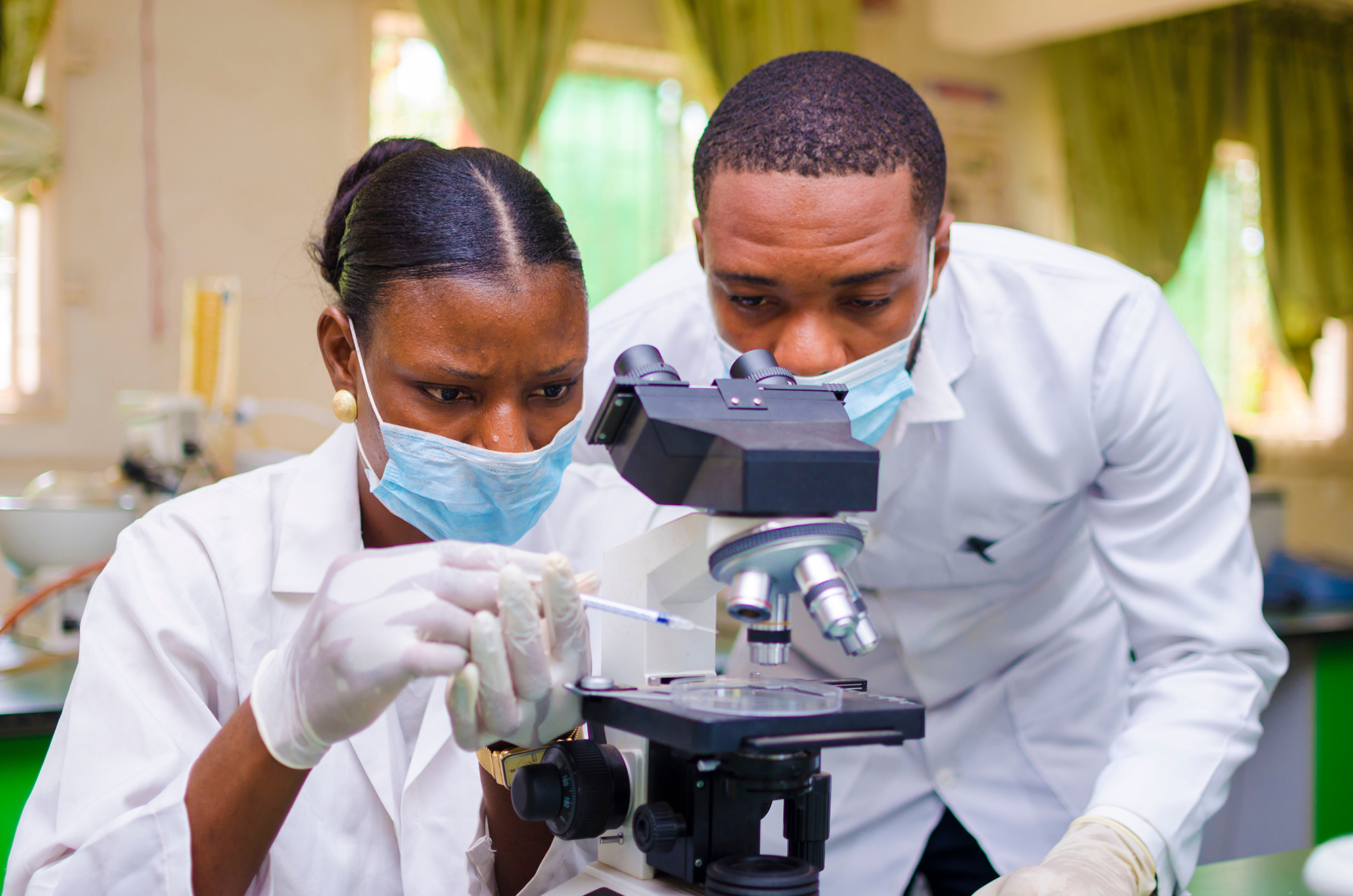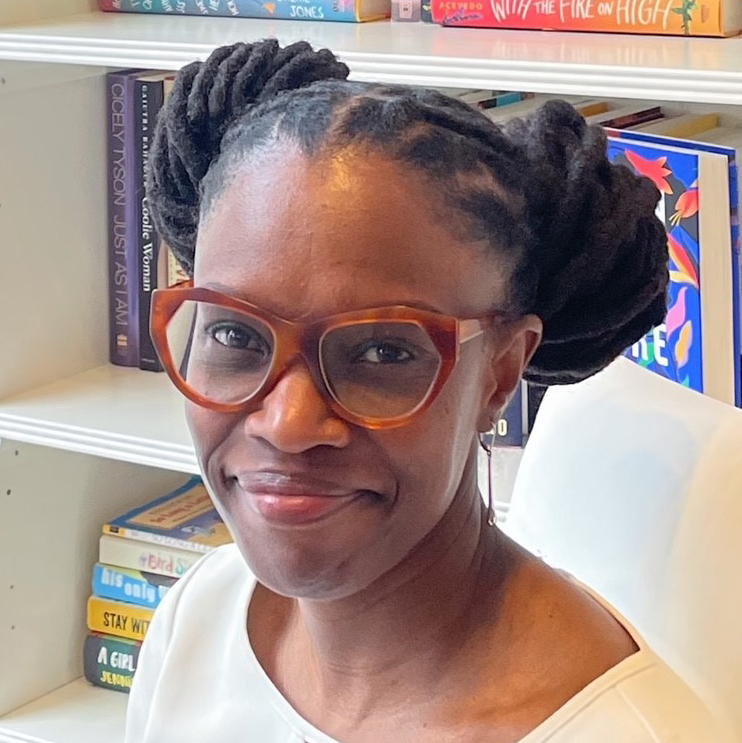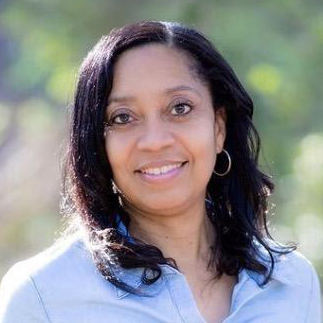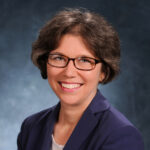Written by Tricia McCarter, CDMP, PCM
and Lynne Harris, MA, APR
“Fundamentally, science is about trying to find an answer to a problem that exists and gathering sufficient data to support your hypothesis. Diversity and inclusion are vital to ensure that everyone, irrespective of where you are in the world, has access to correct data for making the best scientific decisions. So, if we want the best science it has to come from a diverse group and there is plenty of data that supports this.” – Laura Eghobamien
Laura Eghobamien is a cellular biologist who offers expertise in cellular immunology, antibody therapeutics, and high throughput screening to small biotech companies. Eghobamien is also the founder of the Black Medical Scientific Network (BMSN) in the United Kingdom. She established it in 2020 after a close friend in the science field revealed her frustration with having to constantly prove her worth and was considering quitting the field altogether.
“I realized that a network was needed to support Black scientists that would enable them to showcase their abilities and to inspire the next generation,” says Eghobamien.
The Black Medical Scientific Network
The mission of BMSN is to increase the representation of Black scientists in the medical and scientific sectors. The organization finds ways to increase this visibility mainly through working with established life science conferences where attendance of Black scientists is often low. They work with conference organizers on ways Black scientists can contribute to the programming as a speaker, panelist, or lead a workshop. If rewards or honorary fellowships are being awarded, they put forward recommendations of Black scientists with the right skillset for consideration.
BMSN also has an informal mentoring scheme to support other Black scientists on their career path. With Eghobamien at the helm, the team includes Pamela Banana Sweeney, Industry Lead/Social Media Lead; Nana-Jane Chipampe, Academic Lead/Social Lead; Emmanuel Adiohwo, Student Lead; Elizabeth Amedjou, Membership Lead/Student Lead; and Lawrence Nyalemegbe, Outreach Lead.
Obstacles Facing Black Scientists in the United Kingdom
Eghobamien says there is vast data to show that Black researchers are under-funded and recently there has been progress made by many research councils to allocate funds specifically targeted at Black researchers.
“Although this change is welcomed, often these funds are limited and certainly not enough for the number of applicants who apply for these funds,” she explains. “It’s a highly competitive process often leaving many students with no access to funding.”
Often, Black scientists do not feel supported when it comes to career progression to senior leadership roles, and often there is no clear path to support or many hurdles to overcome.
“Those who are the decision makers at higher education institutes hire those they know, and very often Black scientists are not given the opportunity as they are unknown to these decision makers,” Eghobamien says. Coupled with this is a feeling of isolation and exclusion that many Black scientists experience in their work environments. She says that even though data shows there is huge inequality, there is little action by those with the power to change it.
“If there were policies in place to fine institutions and companies who do not take deliberate action to ensure that Black scientists can contribute to science in an equitable way, these barriers will continue to exist.”
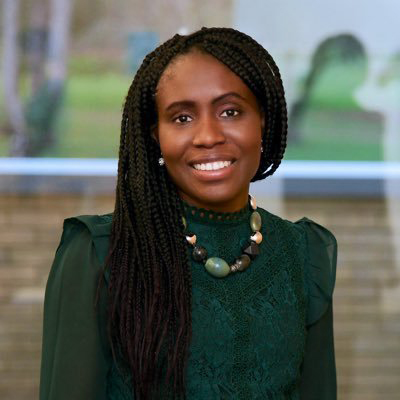
From Personal Tragedy to Bold Action
Eghobamien’s fascination with science began at age 11. “I always thought doing my practical chemistry classes were super cool,” she says. When Eghobamien was 14, her mother almost lost her life while giving birth to her sister. She had pre-eclampsia, a life-threatening complication in pregnancy.
“I later understood that this condition was due to a breakdown in immune tolerance. Furthermore, the concept of immunological tolerance was one that I still find intriguing and sparked my interest in immunology.”
By the time she was 21, during her undergraduate degree, she lost a close aunt to pancreatic cancer. This left Eghobamien disheartened and fueled a huge urge to be able to pursue a career in science that would find a cure for cancer and her interest in drug discovery and pharmacology.
As her career progressed Eghobamien also worked as a STEM role model at schools.
“My involvement in schools started over a decade ago when I participated in the Women of the Future conference at the John Innes Centre in Norwich organized by Dr. Samantha Fox. I volunteered to be one of the role models for this event. This was a 1-day conference where over 500 Year 10–11 girls would have the opportunity to interact with female scientists and hear about their careers.”
Eghobamien says it was an exhilarating experience engaging with so many young girls and inspiring them about careers in science. Since then, she has visited a number of schools giving talks and advice about careers in science.
BMSN is now five years old, and she hopes to be able to reach and support as many Black and underrepresented scientists across the globe to ensure their work is visible to as many people as possible. Eghobamien wants to ensure that at every major scientific meeting Black scientists can contribute equitably, are well represented, and that Black scientists are adequately rewarded for their scientific contributions.
“As we grow, we want to be able to provide workshops and collaboration with other organizations who share our passion to support Black scientists.”
Portraits of Black Female Scientists
Eghobamien’s chance meeting with a photography lecturer at an outreach event in Norwich led to the development of the idea for the Portraits in Black Female Scientists project. They spoke about representation and images, and she thought it would be wonderful to capture images of Black scientists. In 2023, the theme of the UK Black History Month was titled ‘Saluting Our Sisters’ and together they jumped at the opportunity to portray Black female scientists and showcase contrasting imagery of what a scientist looks like in today’s world.
The result is an ongoing project featuring early-career scientists in particular to inspire those who are thinking about a career in science and to show that it is possible to attain a leadership position in science. The project was showcased at an exhibition at Storey’s Field Centre in Cambridge in collaboration with the Cambridge African Network.
Here are some of the Black female scientists from the inaugural project.
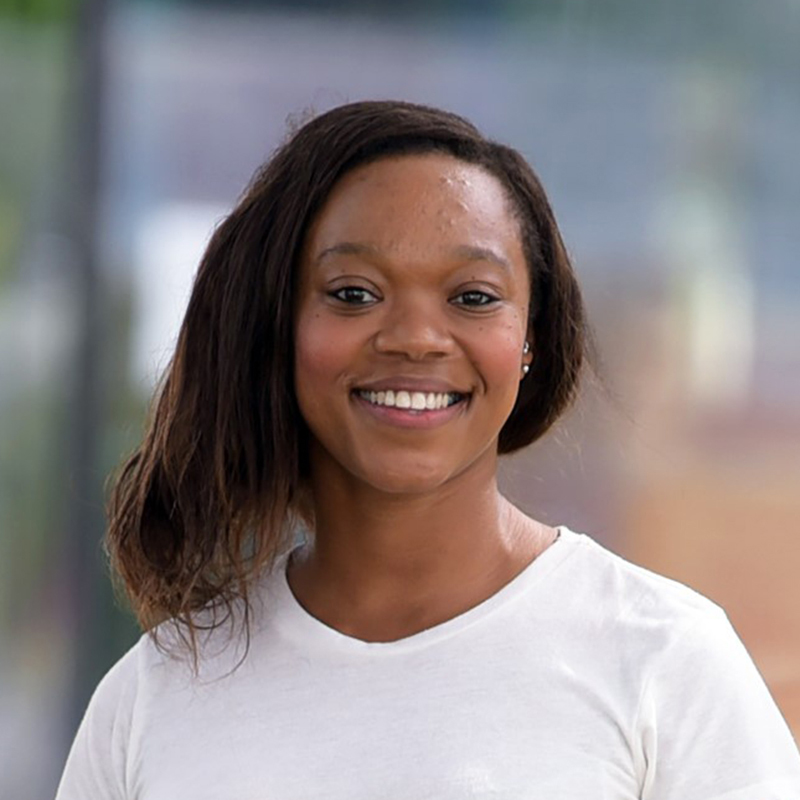
Nana-Jane Chipampe, PhD is a Histopathology and Imaging Specialist at the Wellcome Sanger Institute. She earned her PhD from Newcastle University, United Kingdom.
Q
What is your scientific area of focus and why is it important to you?
A
My scientific focus lies in the examination and analysis of human tissue biopsies. I utilize my expertise in Histopathology to investigate cellular structures and disease processes under the microscope. Histopathology is fundamental to understanding disease at a cellular level, providing crucial insights into diagnosis, prognosis, and patient driven treatment strategies. Through advanced microscopy imaging techniques and tissue analysis, my work supports academic research groups in generating high-quality data that can drive scientific discovery and improve patient outcomes.
During my PhD, I collected patient tissue samples post radical cystectomy surgery, and engaged directly with bladder cancer patients, gaining firsthand insight into the symptoms and challenges they face. These experiences reinforced my commitment to applying scientific histopathological techniques to enhance diagnostics, develop targeted therapies, and communicate findings to wider audience. All with the ultimate goal of improving lives.
This field is important to me because it bridges the gap between research and real-world, patient-focused clinical impact. In addition, knowing that my work enhances diagnostic accuracy and informs effective, personalized, patient-focused treatment strategies, provides me with a profound sense of daily fulfillment.
Q
How did you become interested in science?
A
My interest in science was sparked at an early age, influenced by both my family and formative experiences. My mother, a retired nurse and health visitor, instilled in me a deep appreciation for healthcare, and my intellectually curious father played a significant role in nurturing my love for science. His conversations about geology, healthcare and physics sparked my fascination with the human body, the natural world, and the principles that govern it. Coupled with my mother’s background in healthcare, these discussions created a rich environment where curiosity and learning were encouraged.
Privately educated at Leeds Girls High School in the UK, I was fortunate to have access to a curriculum that included human biology, along with the benefits of smaller class sizes and personalized tutoring. This early exposure to scientific concepts, along with a unique work experience opportunity within a histopathology department, through my pathologist neighbor, solidified my desire to deepen my understanding of the human body. This passion led me to pursue a degree in Biomedical Sciences at Durham University, UK and ultimately, a career dedicated to research and scientific discovery. Each step in my journey reinforced my commitment to science, ultimately leading me to a career in scientific research.
Q
How does it feel to be featured in the Portraits of Black Female Scientists project?
A
Being featured in the Portraits of Black Female Scientists project is an incredible honor. This initiative not only celebrates the contributions of Black women in science but also serves as an important platform to inspire future generations. Representation matters and seeing diverse role models in STEM can encourage young scientists to pursue their ambitions with confidence.
For me, this recognition is both humbling and empowering. It acknowledges the dedication and perseverance required to navigate a career in both science and research, while highlighting the vital contributions of Black female scientists to scientific advancement. I hope that by sharing my journey, I can help break down barriers and encourage more aspiring researchers to follow their passions in science and academia.
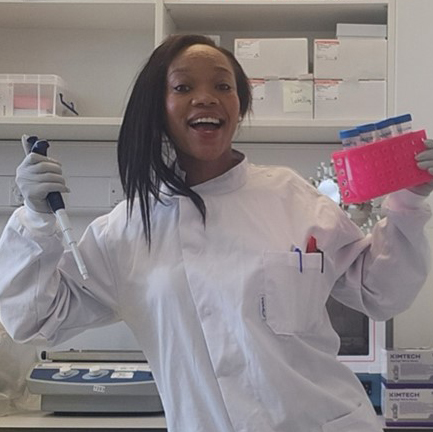
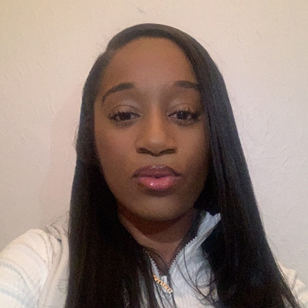
Melissa Jade is pursuing her PhD in biophysics at Kings College London, UK.
Q
What is your scientific area of focus and why is it important to you?
A
My research focuses on computational material modelling small molecule drugs observing their permeability in gut lipid membranes and surfactant micelles. My PhD is important to me because I feel the value of being certified the accolades and perks of being a doctor is different especially coming from a low economical background. But most importantly I get to contribute to research and many generations after me will be able to see the work that I have done. I am honestly grateful to have done this PhD. I plan to continue my career in academia or become a research software engineer.
Q
How did you become interested in science?
A
My interest came from my engineering bachelor’s degree and completing my masters in biomaterials and tissue engineering. I love materials and my masters open my eyes to more of a biological perspective of materials.
Q
How does it feel to be featured in the Portraits of Black Female Scientists project?
A
I feel proud and somewhat grateful that people that look like me can see we are also in this sector.
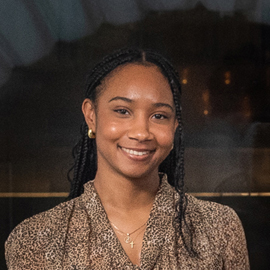
Sophie Martin, PhD works in academia as a Research Fellow. She earned her PhD in Artificial Intelligence for Medical Imaging from the University College London, UK.
Q
What is your scientific area of focus and why is it important to you?
A
My research focuses on using artificial intelligence for the advancement of healthcare such as the early detection of dementia from brain scans. I am particularly interested in their application in real-world settings, explainability, fairness and robustness. I believe that if the future is to be revolutionized by AI, then we need to make sure that it will be of equitable benefit to everyone.
Q
How did you become interested in science?
A
I have always enjoyed learning, and science is essentially the never-ending process of that.
Q
How does it feel to be featured in the Portraits of Black Female Scientists project?
A
I feel honoured to be included, and hopeful that young people will eventually see themselves reflected in those interested in and pursuing scientific careers.
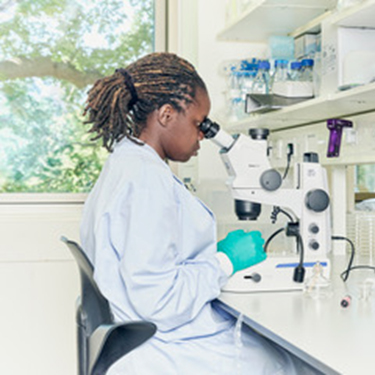
Martha Mercy Mulongo is a Research Assistant at the Wellcome Sanger Institute in the UK. She earned her Bachelor of Science technology degree in Biology from Kyambogo University in Uganda.
Q
What is your scientific area of focus and why is it important to you?
A
My scientific interest is research into pathology, more so the nematodes. Nematodes are of great economic importance assisting with soil aeration and biodiversity. Additionally, they are parasitic affecting food security, and cause disease in animals, such as sheep leading to a reduction in production.
Q
How did you become interested in science?
A
While in high school I became interested in science as I enjoyed practically carrying out experiments, and I performed well. Science is a way of discovery, questioning and finding answers to some existing questions and answers. I love science for the diversity in careers. As a Research Assistant currently working in the Tree of Life program at the Wellcome Sanger Institute, I prepare high-quality genetic material to understand the diversity and evolution of nematodes in our environment. This enables us to understand dynamics of genetic change, understand parasitism and the diversity on earth, a key branch of the Tree of Life. This is an important discipline, as there are lots of existing tiny microorganisms that are non-described.
Q
How does it feel to be featured in the Portraits of Black Female Scientists project?
A
Being featured in Portraits of Black Female Scientists project gives me confidence in what I do, creating networking opportunities with like-minded people.
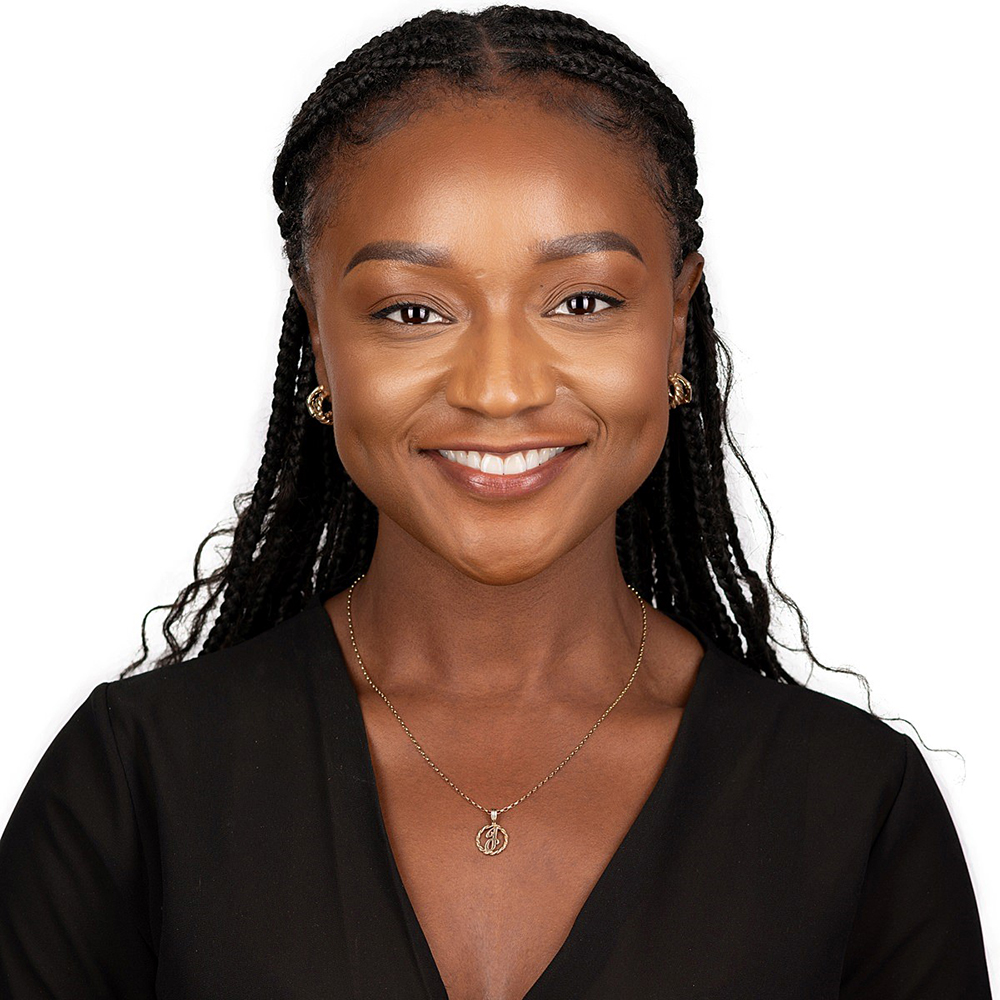
Jennifer Ofoedu works as a Scientist at Valink Therapeutics focusing on the development of Antibody Drug Conjugate (ADC) Therapeutics for treatment of cancer in the UK. She earned her Master of Science degree in Physiology and Pharmacology at King’s College London.
Q
What is your scientific area of focus and why is it important to you?
A
Cancer research because I’ve always been interested in therapeutics. Before I started my career, I thought chemotherapy was the only option. I wanted to know what else scientists were developing to treat cancer. It’s important to me because it’s my way of making a difference.
Q
How did you become interested in science?
A
I was always interested in science at a young age, I actually thought I was going to be a doctor. There’s actually a picture of me in nursery with a stethoscope on! My aunty is a doctor and seeing her made me think that it was possible. But I didn’t get into medicine and ended up studying a biomed course. I quickly fell in love with the process of scientific research, and later drug development. Before then, I hadn’t even realised being a scientist was an option.
Q
How does it feel to be featured in the Portraits of Black Female Scientists project?
A
It makes me feel optimistic for the next generation of Black female scientists. I think people often underestimate the importance of representation, but when you see someone who looks like you in a space where you didn’t think you could belong, it makes you feel like you can do it too.
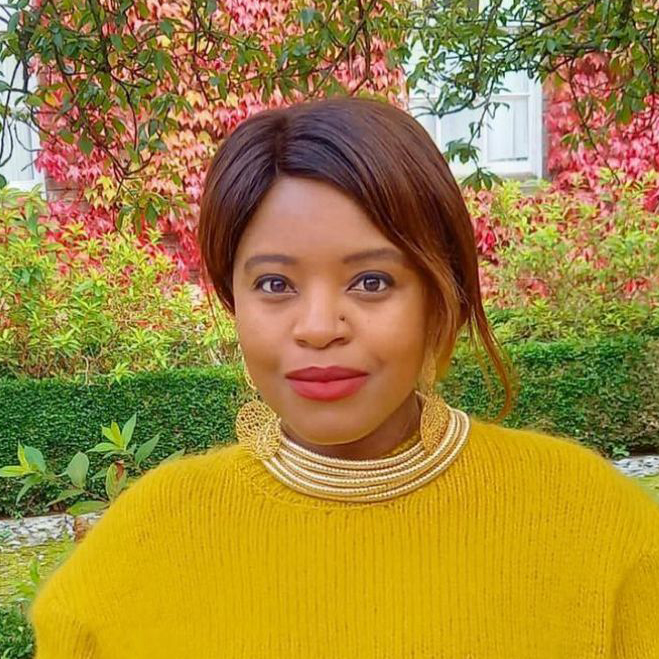
Pamela Banana Sweeny, PhD earned her degree in Chemistry from the University of Warwick and currently works at Hyaltech Ltd., a biomedical company near Edinburgh, UK.
Q
What is your scientific area of focus and why is it important to you?
A
I am particularly passionate about drug discovery, especially in the pursuit of novel treatments for incurable diseases and conditions that present significant challenges, such as cancer. My previous experience includes antimicrobial research, driven by the growing need for new therapeutic options. Drug discovery captivates me because it holds the potential to transform lives and offer hope in the face of serious illnesses.
Q
How did you become interested in science?
A
From a young age, I was captivated by biology, chemistry, and mathematics. I realized early on that my career path would lead me into the world of science. I find the subject both intriguing and challenging, but what fascinates me even more is its remarkable ability to transform lives. Science addresses numerous challenges and offers solutions to a wide array of problems including the medical, technology, food and energy industries.
Q
How does it feel to be featured in the Portraits of Black Female Scientists project?
A
I feel truly honored and privileged to be featured in Portraits of Black Female Scientists. It’s essential for Black scientists to be represented, recognized, and acknowledged for their significant contributions to the field of science. We need to advocate for greater visibility not only during Black History Month but throughout the entire year.
ASPET thanks Lynne Harris, MA, APR, for her contributions to this article and for working with Laura Eghobamien to make this possible.
Authors
-

Tricia McCarter, CDMP, PCM, is ASPET’s Senior Coordinator of Marketing and Communications and the Managing Editor of The Pharmacologist. She has more than five years of communications and marketing experience within the non-profit industry. She holds a master’s degree in journalism and a double certification as a Certified Digital Marketing Professional through the Digital Marketing Institute and a Professional Certified Marketer in Digital Marketing through the American Marketing Association.
View all posts -

Lynne Harris, MA, APR, is ASPET’s Director of Marketing and Communications and Executive Editor of The Pharmacologist. She has more than 15 years of experience as a senior-level executive leading communications strategy and 10 years as a journalist. She holds a master’s degree in strategic public communications, Accreditation in Public Relations (APR) through Public Relations Society of America and a certificate in Integrated Communications.
View all posts

